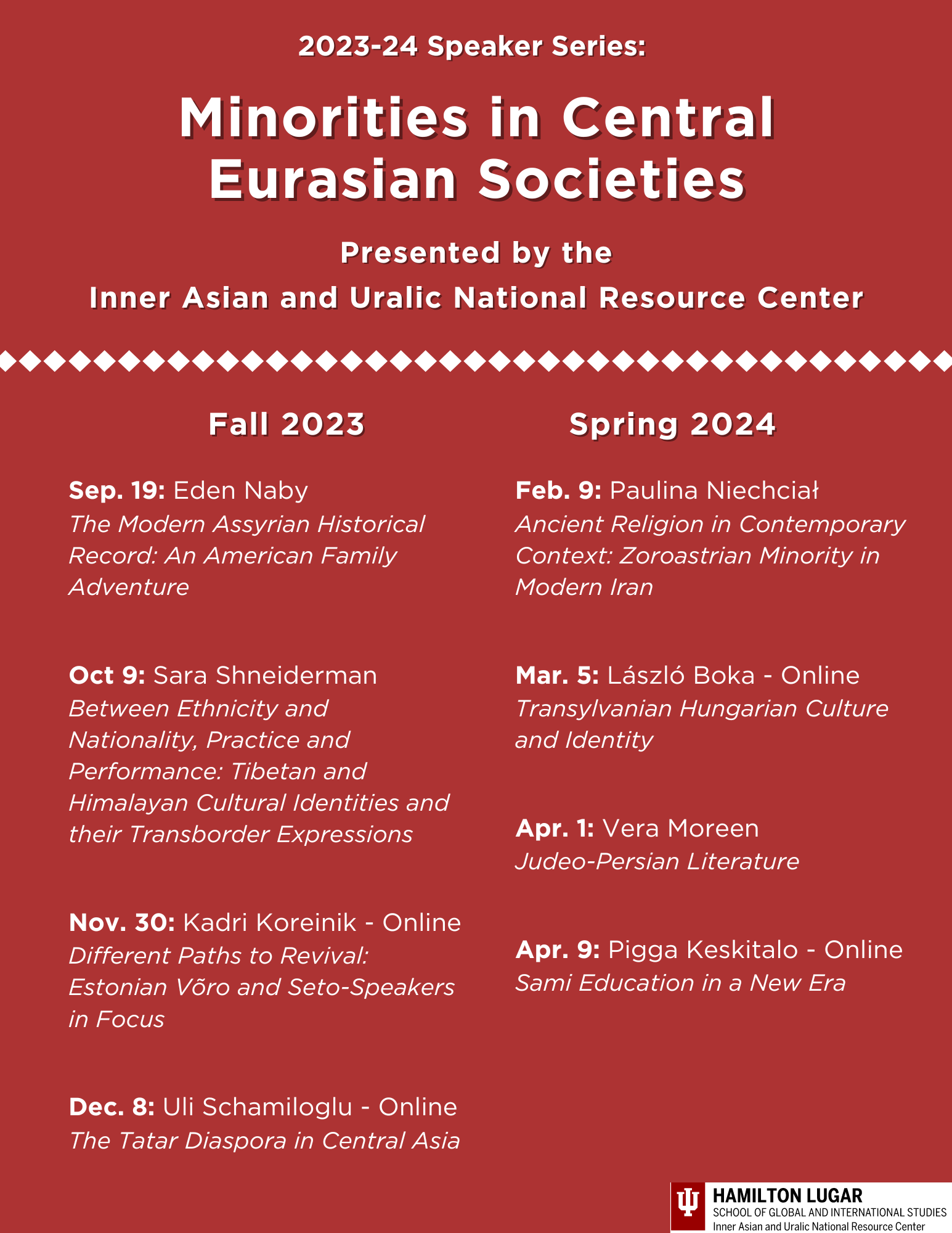The IAUNRC’s 2024 lecture series, “Minorities in Central Eurasia,” continued into the Spring semester with talks on subjects as diverse as Zoroastrian communities in contemporary Iran, the culture and literature of Transylvanian Hungarians, Sami-language education in Finland and its Scandinavian neighbors, and the long and distinguished tradition of Jewish literature written in Persian.
"Ancient Religion in Contemporary Context: Zoroastrian Minority in Modern Iran" with Dr. Paulina Niechciał
The semester’s first speaker was Paulina Niechciał, Assistant Professor in the Centre for Comparative Studies of Civilizations at the Jagiellonian University in Krakow and visiting scholar at the Skalny Center for Polish and Central European Studies at the University of Rochester. On January 9th, Dr. Niechciał delivered a lecture on the challenges facing the Zoroastrian minority in contemporary Iran and the Zoroastrian community’s strategies for coping with these challenges. In addition to their status as a minoritized religious community living under a government committed to Islamization, Iranian Zoroastrians also face pressures related to declining birth rates within the community and emigration. One particularly pressing challenge is the maintenance of a priestly community, as Zoroastrian priests do not receive enough financial support to be able to make a living as religious specialists, forcing them to take up other work on the side and making the priestly vocation unattractive to the younger generations. Despite these challenges, Niechciał’s ethnographic research in Tehran has highlighted the Zoroastrian community’s resilience, showing that contemporary Zoroastrians are able to both maintain their religious distinctiveness and position themselves as good Iranian citizens through strategies like displaying photographs of Iranian soldiers who had died in the Iran-Iraq War in their temples.
"Transylvanian Hungarian Literature and the Communist Past" with Dr. László Boka
Next, on March 5th, Dr. László Boka delivered a talk titled “Transylvanian Hungarian Literature and the Communist Past.” Professor Boka is a senior research fellow at the HUN-REN Institute for Literary Studies, Budapest and Associate Professor at Partium Christian University, Oradea. In this talk, he began by providing a historical overview of the geopolitical contexts that shaped the boundaries and demographics of the Hungarian population in Europe. Following World War I, there was a sizeable Hungarian community in Transylvania, a region in central Romania. During this time, local intellectuals developed a particular ideology of Transylvanianism, a political movement in which the Hungarian minority played a complex role. In the second half of the lecture, he highlighted various exemplary literary depictions of the difficulties faced by Hungarians (and other ethnic minorities) in communist Romania. He concluded the lecture by describing the national and global reception of this literary movement, including books which have been translated into English.
Judeo-Persian Literature with Dr. Vera Moreen
Continuing the theme of literary activities of minority groups, on April 1st, Dr. Vera Moreen presented a lecture titled “Judeo-Persian Literature.” Dr. Vera Basch Moreen holds a doctorate from Harvard University from the Department of Near Eastern Literatures and Civilizations. She has taught Islam at Swarthmore, Haverford, and Franklin & Marshall Colleges. Her specialties are the history, literature, and art of Iranian Jews between the fourteenth and eighteenth centuries based on Judeo-Persian manuscripts. An expert it the field of Judeo-Persian literature, her most recent book is The Bible as a Judeo-Persian Epic: An Illustrated Manuscript of ʻImrānī’s Fatḥ-Nāma (Jerusalem: Ben Zvi Institute, 2016). The lecture that she delivered as part of the IAUNRC lecture series traced the religious and cultural achievements of Jewish communities in Central Asia and Iran from the centuries before the advent of Islam into the medieval and early modern eras. She described how Judeo-Persian literature flourished under the hegemonic Persian literary sphere.
"Sami Education in a New Era" with Dr. Pigga Keskitalo
Finally, on April 9th, the “Minorities in Central Eurasian Societies” lecture series concluded with a lecture from Dr. Pigga Keskitalo titled “Sami Education in a New Era.” Pigga Keskitalo holds a PhD in Education and is a Professor of Education, specifically in Arctic perspectives in education, at the University of Lapland, Faculty of Education, Rovaniemi, Finland. She is also an Adjunct Professor (Title of Docent) at the University of Helsinki. She is also a member of the Sámi Parliament of Finland. In this lecture, she drew on her own experiences as a member of the Sami community, and as both a former student and an educator, to reflect on various education initiatives for Sami in Finland. One of the main drives to encourage Sami indigenous language proficiency is through the development of distance education, to ensure that Sami children and students can learn in their own language in any location, not just centralized centers with dense Sami populations. Beyond focusing on only the Sami language, Dr. Keskitalo also described how these education initiatives are attempting to incorporate indigenous knowledge practices into the curriculum alongside the Sami language in order to revitalize traditional practices in modern educational settings.
The IAUNRC was proud to organize and sponsor the 2023-24 “Minorities in Central Eurasian Societies” lecture series. We look forward to presenting the lecture series for the 2024-25 academic year which will be centered around environmental issues throughout Central Eurasia.


